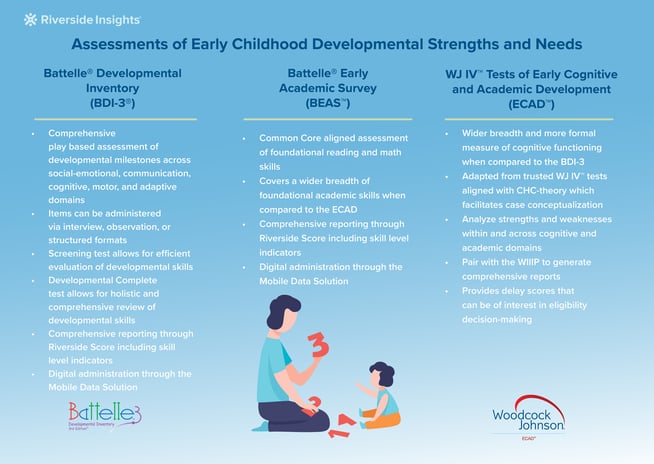Exploring Assessment Tools for Early Childhood Development
.png)
Riverside Insights offers powerful early childhood assessment tools that assess areas important for development. It is essential to remember that there isn’t one tool that can do it all.
Practitioners are encouraged to review the properties of the assessment tools available to them and design an assessment battery most appropriate for their specific needs. Practitioners are also encouraged to use multiple sources of data to gain the most comprehensive picture of a child’s functioning.
Use cases for two of our prominent early childhood assessments are included below.1
Find a downloadable comparison chart at the end of this article.
Battelle® Developmental Inventory (BDI-3®)
The BDI-3 is a developmental milestone assessment designed to provide information regarding whether a child is following the proper sequence of growth compared to age-based standards and expectations.
The BDI-3 is recommended for practitioners interested in assessing strengths and weaknesses in observable behaviors and skills related to developmental growth. The BDI-3 follows a standardized play-based assessment model and is to be given in a child’s natural environment.
The Battelle® Developmental Inventory, Third Edition (BDI-3®) is a comprehensive assessment that measures five areas of developmental milestones from birth to 7 years 11 months:
 The BDI-3 suite includes a Screening Test, Developmental Complete Assessment, and the Battelle Early Academic Survey.
The BDI-3 suite includes a Screening Test, Developmental Complete Assessment, and the Battelle Early Academic Survey.
Battelle® Early Academic Survey (BEAS)
Use the Screening Test to quickly and effectively evaluate early childhood developmental milestones to help identify children that are at risk for developmental delays or disabilities.
Follow up screening with the comprehensive assessment options offered by the Developmental Complete. It can also be used as a standalone holistic and accurate measure of developmental milestone progression.
The Battle Early Academic Survey (BEAS) is a Common Core aligned assessment that can be used measure a wide breath foundational reading and math skills for those 3.6-7.11.
Use the BEAS to:
- Assess students transitioning from preschool to kindergarten
- Develop IEP goals for early primary school students
- Monitor progress in reading and math
- Screen children with developmental delays identified by the BDI-3
- Screen children in general education
Practitioners can learn more about the BDI-3 here.

Woodcock-Johnson IV Tests of Early Cognitive and Academic Development (ECAD®)
The Woodcock-Johnson IV Tests of Early Cognitive and Academic Development (ECAD®) is a quick-to-administer and developmentally appropriate measure aligned with CHC theory, and was was adapted from trusted Woodcock-Johnson IV tests for those aged 2.6 to 7.112.
The ECAD is recommended for practitioners seeking to assess the latent abilities that underlie observable behaviors and skills related to developmental growth.
The ECAD assesses emerging cognitive, academic, and expressive language skills and provides critical information for early childhood practitioners looking to target areas of student need.
When paired with the WJ IV Interpretation and Instructional Interventions Program™ (WIIIP®), practitioners can generate comprehensive reports combining qualitative reports from parents and teachers with data culled from their assessment. These reports can also provide evidence-based instructional interventions and recommendations to address identified problem areas.
Practitioners can learn more about the ECAD here.

1 The use cases described are not an exhaustive list. Practitioners are encouraged to consult with their Assessment Consultant and/or Customer Support with any questions regarding the use of our assessments.
2 The ECAD can be administered to those up to 9.11 who have cognitive delays.





-1.png)